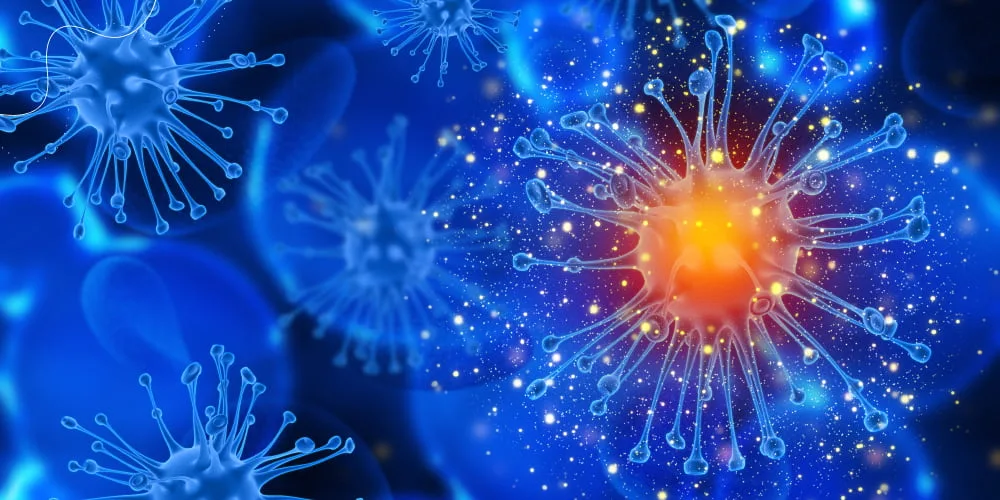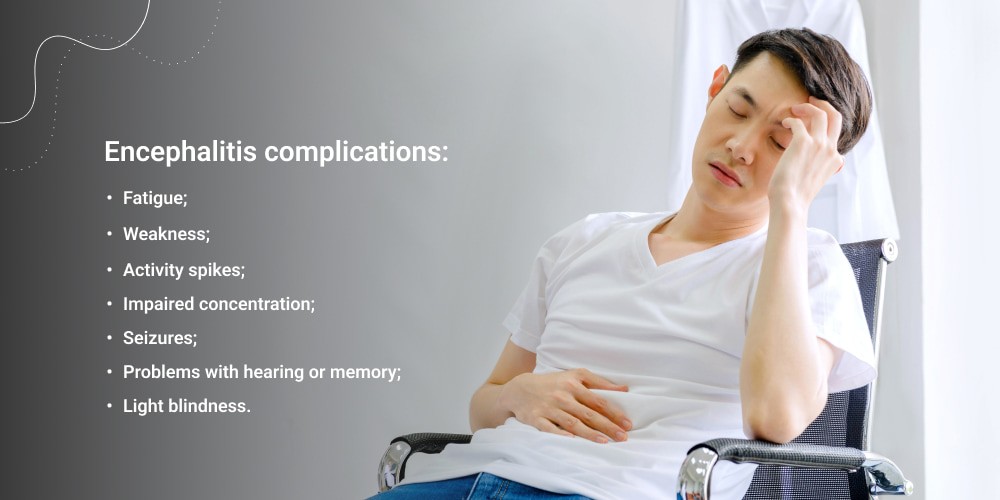Encephalitis is an inflammation of the brain that develops due to a viral or bacterial infection against the background of acute poisoning or an autoimmune lesion. Potentially, any virus can cause encephalitis, but not everyone infected will suffer from the disease. There may also be difficulties in concentration, behavior, speech, and memory loss. In sporadic cases, patients are in a vegetative state.
The most frequent long-term effects of viral encephalitis are the common attacks, which can occur in 10-20%. Most patients are recovering from encephalitis without consequences. According to statistics, people with a weakened immune system are more often affected. However, due to illness, some patients:
- develop intellectual disorders;
- changes in mood and behavior;
- extra-pyramids symptoms;
- hyponatraemia (especially after Saint-Louis encephalitis);
- encephalopathy;
- mononeuropathy.
Аutoimmune encephalitis life expectancy is as follows:
- 80% of cases last 1 to 3 years;
- 10% of patients live longer (up to 10 years);
- 10% of patients have a lightning-fast course.
What Are the Long-term Effects of Encephalitis?
Long-term encephalitis complications include permanent mental impairments, changes in nature, autism-like behavioral problems, and epilepsy. The most severe encephalitis after effects include persistent seizures (status epilepticus), cerebral haemorrhages and brain swelling (cerebral oedema). These complications are emergencies that require immediate emergency medical attention. Sometimes Parkinson’s disease develops from encephalitis as a late complication. Depending on the type and severity that have arisen after the illness, additional treatment may be needed, such as:
- Physiotherapy to improve strength, flexibility, balance, and coordination of movements.
- Rehabilitation for developing everyday skills and using adaptive products that help in everyday life.
- Training with a speech therapist to renew the skills of muscle control and coordination during the speech.
- Treatment of stress and new behavioral skills for treating effective disorders or changes in personality.
- In case of necessity to use medicinal preparations.
However, if a patient seeks medical help in time, undergoes a diagnosis, and receives an entire treatment course, there is hope for a healthy life afterward.
The Likelihood of Being Cured of Encephalitis
The chances of healing encephalitis without side effects largely depend on the cause (the pathogen), the time of diagnosis and the start of treatment, and the affected person’s general condition. The earlier the therapy begins (preferably in a neurological department), the better the chances of a complete recovery.
In the most common form, brain inflammation caused by herpes simplex viruses, the survival rate is about 80 percent, with virtually no encephalitis after effects. However, it is possible that permanent nerve damage remains. At 98 percent, the survival rate of brain inflammation caused by TBE viruses is significantly higher. Patients suffering from severe encephalitis also need additional support therapy:
- Auxiliary breathing, as well as careful monitoring of breathing and heart activity.
- Fluids are injected internally to fill in the loss of the liquid and the appropriate level of the required mineral substances.
- Taking anti-inflammatory drugs, such as corticosteroids, to reduce swelling and internal pressure.
- Anti-cramp drugs such as phenytoin (Dilantin) to prevent or stop cramps.
Encephalitis Side Effects in Children
If a child becomes restless and sleepy, vomiting, has a headache or reddening of the skin, an ambulance should be called immediately. Children may be asymptomatic, and the first signs are often mistaken for the flu. If they occur, parents should be reassured so as not to endanger the child’s life.
Expected consequences of encephalitis in children include:
- muscular atrophy;
- mental retardation;
- mental disorders;
- impaired hearing and vision;
- epileptic seizures;
- problems with speech and language;
- there are situations where a child with severe encephalitis has no adverse effects, but the likelihood of death is very high.
What Are the Light Encephalitis Complications?
In most cases, people with relatively light disease recover for several weeks without any complications in the long term. Brain failure as a result of the transferred inflammation can lead to a number of problems. Other complications of different severity may be preserved for several months or until the end of life:
- Fatigue;
- Weakness;
- Activity spikes;
- Impaired concentration;
- Seizures;
- Problems with hearing or memory;
- Light blindness.
How Long is Recovering from Encephalitis?
The illness usually lasts about 14 days, and rehabilitation takes at least two months. A patient with suspected tick-borne encephalitis is urgently admitted to a neurological hospital. If the patient has not been previously vaccinated, anti-Rickettsial Immunoglobulin is administered on the first day.
The main areas of treatment for encephalitis include:
- dehydration to prevent cerebral oedema;
- anti-inflammatory therapy;
- control of hypoxia;
- desensitization;
- angioprotective agents;
- restoration of metabolism in the central nervous system;
- stabilization of the water-electrolyte balance.
Symptoms such as tremors, paralysis, hyperkinesias, and neuroendocrine disorders may remain after the acute period has passed. For complete recovering from encephalitis (in the absence of contraindications), prescribe:
- physical therapy;
- muscle relaxants;
- massage;
- neuroleptics;
- anticonvulsants;
- cholinolytics;
- antioxidants;
- nootropics;
- drugs to improve metabolism.
Correctional psychotherapy and social adaptation are also added. The duration of rehabilitation after encephalitis depends on the severity of the disease and can last from several months to several years. Autoimmune encephalitis life expectancy can be long enough if all the rules are followed.
Contact Lone Star Neurology to Find Out More Information about Encephalitis
The main factors influencing the appearance and nature of the after-effects of encephalitis are: a patient’s age and the disease’s severity.
Successful treatment is significantly increased if the condition is diagnosed early. It is hazardous if the disease develops without pronounced symptoms. The person does not feel much discomfort, but the inflammation spreads to the brain cells quickly. The encephalitis complications are unpredictable in each case. The situation is complicated because in the first stage of the disease, the person does not give importance to the symptoms, considering them a manifestation of a cold.
Self-treatment and a reluctance to go to a health centre can lead to death – sometimes, encephalitis destroys brain cells quickly. It is why it is essential to find the right and competent doctor. Lone Star Neurology centre is dedicated to providing neurological help encompassing:
- courtesy;
- compassion;
- quality care;
- excellence;
- promptness.
FAQ
- Can you live a normal life after encephalitis?
The answer is unequivocal “yes”. After encephalitis you can live a normal life and no worse than before. The most significant thing is to find the right specialist and rehabilitator to help you through this difficult journey.
- How long does it take the brain to recover from encephalitis?
Recovering from encephalitis can take a very long time. The duration depends on the specific pathogen, the person’s immunity, the epidemic situation, and attitude. However, the average is about a month and a half.
- Can encephalitis change your personality?
Yes, it can be one of the encephalitis side effects as changes occur at the neurological level. But all such abnormalities can be corrected and restored to normalcy through psychotherapy and rehabilitation.
- Is brain damage from encephalitis permanent?
Yes, this severe brain infection can lead to irreversible consequences, even including death. It is therefore vital to recognize the early signs of the disease at an early stage and to start early treatment with competent specialists.
- How else can I catch encephalitis?
You can become infected by visiting tick-borne encephalitis-endemic areas in forests, woodland parks, or individual garden plots, ticks carried by dogs or cats, or flowers and branches.













Please, leave your review
1 Comment
Said Khamis
19/03/2024
Excellent review
May i have a pdf format ?
Write a comment: